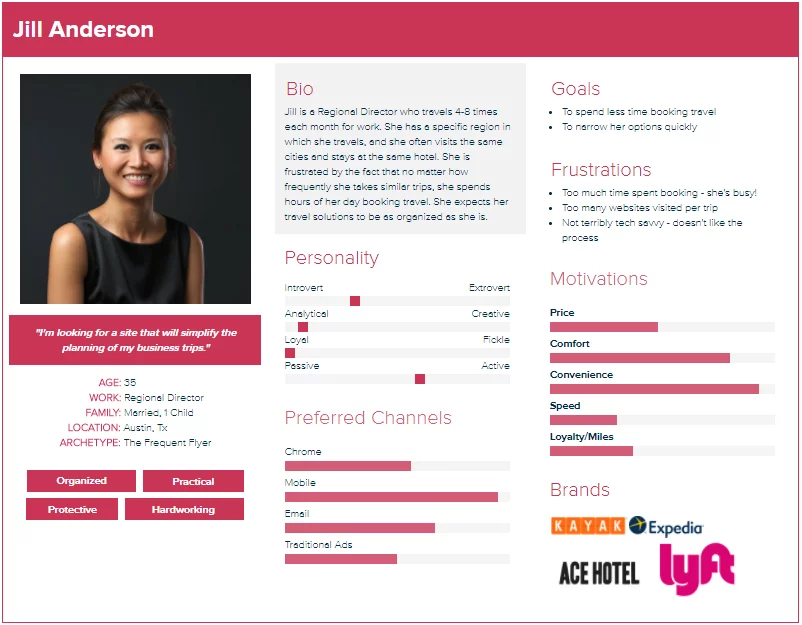If you ask a group of marketers how they go about developing audience personas, odds are that they’ll all have varied approaches—usually a combination of consumer research, analysis, and perhaps even a bit of trial and error.
Ask that same group of marketers if they’re 100% confident that their audience personas are an accurate representation of their buyers and you’re more likely to get a unified response of uncertainty. That’s because nailing down personas is as difficult as it is important. Let’s take a look at a typical audience (or buyer) persona:

Buyer personal source: Neil Patel
While the above is a great starting point, it’s lacking. And that’s because it—like most customer profiles—relies on superficial information about the consumer that when boiled down, doesn’t reveal much about them.
A big reason why is that marketers rely heavily on first party data (a company’s own data) to create personas. If you were to put each persona they developed side-by-side, we’d be willing to wager they don’t look too different from each other. After all, most consumers are motivated by some combination of price, comfort, and frictionless customer experience.
Despite the above, we know personas are important. 93% of companies who exceed their lead and revenue goals segment their database by buyer persona. Imagine just how effective your marketing campaigns could be if you had buyer personas that moved beyond first-party data to understanding their affinities, interests, and what motivates them to purchase.
How do you accomplish this? Cue social audience insights.
The importance of social insights to buyer personas
Knowing if your audience prefers Chrome to Safari or is more analytical vs. creative isn’t particularly useful (unless your product has a Chrome plug-in). What is useful is understanding your audience’s interests, affinities, and motivations on a deeper level—which will reveal far more actionable insights relevant to your brand’s goals. To gain access to these insights, you need to go to where people spend an overwhelming amount of their time and share the most meaningful details—social media.
A solid social audience insights platform allows you to pick your target audience criteria and track key insights about their behavior across various social channels from who they follow to the type of content they share and engage with. Basically, you can connect the dots between social channels to gain a deeper understanding of your audience.
And that’s just the beginning of what you can do with these rich audience insights. Let’s take a look at four ways social audience data can enhance your marketing strategy.
1.) Gain a holistic view of audience
Every marketer wants to understand what influences their customers’ decision-making and as we discussed above, social insights offer a direct view into this line of thought by filling in the gaps. First-party data primarily focuses on demographics (e.g. age, location, etc.) and purchase history whereas the right social data reveals behavioral insights like their self-declared interests and affinities. Only when you put the two together can you truly understand a customer’s interactions with your own brand and finally have the holistic view necessary to effectively develop and inform your personas.
2.) Target audiences based on unique persona attributes
Once you understand who your customer-base is, creating marketing campaigns to target more people just like them is easy. The right platform will allow you to model social audiences after unique persona attributes like interests, hobbies, and affinities that your customer base shares so that you can tailor your messaging to reach them.
3.) Enhance outreach on paid or other channels
Another benefit to a solid social audience insights platform is the ability to determine how different audiences engage with social channels or other earned media outlets. Understanding this will help you to create a far more superior outreach strategy by honing in on the right distribution channels—from influencer partnerships to leveraging specific content—to engage with your ideal audience.
4.) Enrich your CRM Data
We all know that there’s a continuous disconnect between insights gained on marketing platforms and a marketer’s own first-party data. Integrate social audience insights with your CRM dataset to reveal your customer’s identity and their interaction with your brand across any platform. This will provide you with a comprehensive and accurate representation of your customers to inform your future marketing strategy.
Final thoughts
As marketers, our goal is to not only discover who our target audience is, but how to reach as many of them as possible. If you’re ready to have a holistic view of your audience so that you can start building highly effective campaigns today, check out StatSocial’s Platform.